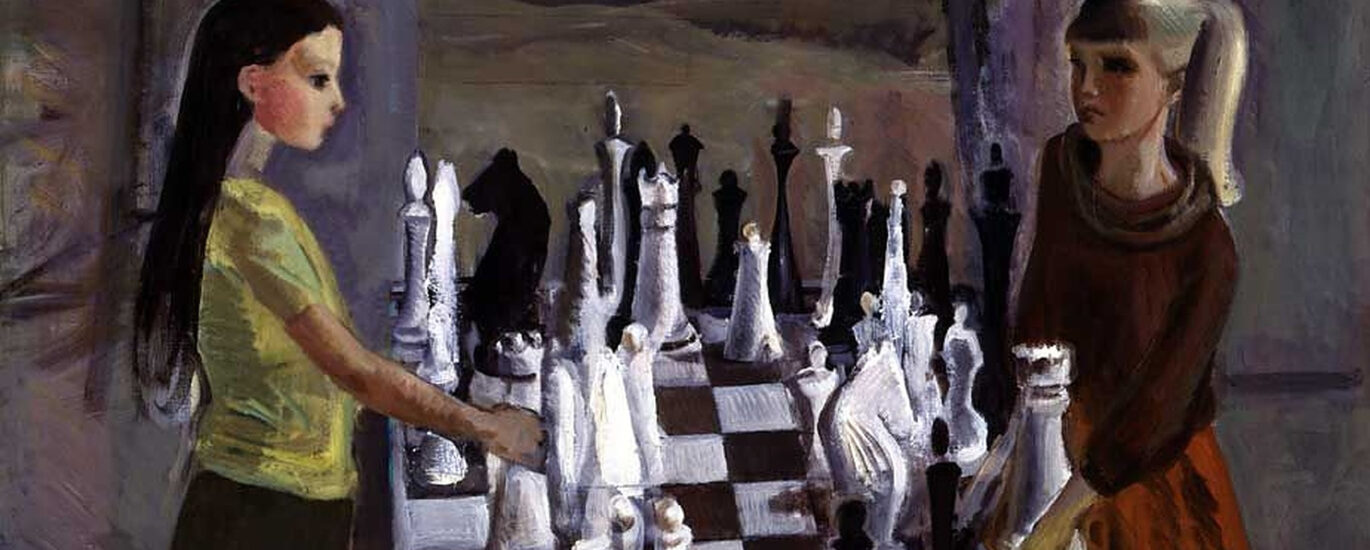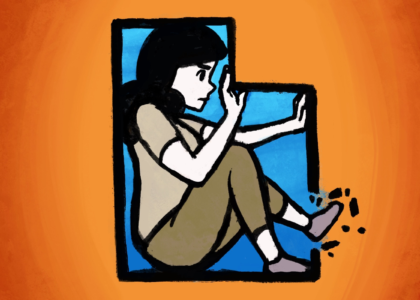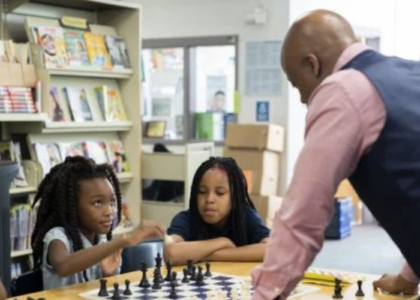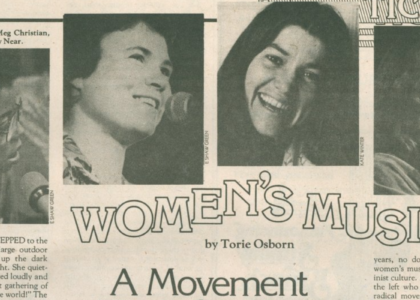“everyone should be given a chance to be good enough.”
On today’s episode I’m joined by one-of-a-kind chess champion and streamer, Anna Rudolf to discuss her experiences in the patriarchal world of competitive chess, including a crash course on the history of female chess champions and an honest discussion about why young women walk away from the game and how everyday people can show up and create change.
Our Guest
Anna Rudolf

Anna Rudolf (she/her) is an Olympic Chess-Player and three-time Hungarian Champion. She holds both the International Master and Woman Grand Master titles. In 2013 she recorded her first video series in the studio of chess24 and has since established herself as an acclaimed chess commentator, streamer and reporter.
Outside of her playing career, Anna is a regular chess commentator at high-profile tournaments, having worked with both Chess.com and chess24. She was the official commentator for the 2018 World Chess Championship together with her childhood idol Judit Polgár. She had started producing instructional videos for chess24 in 2013, and has co-hosted a series with fellow IM Sopiko Guramishvili where they are known respectively as Miss Strategy and Miss Tactics. She launched her own Twitch channel in 2018 and also runs her own YouTube channel.
To learn more about Anna, you can visit her website annarudolfchess.com or tune in to one of her livestreams at twitch.tv/anna_chess
The Interview
Amy Allebest: Welcome to Breaking Down Patriarchy. I’m Amy McPhie Allebest and today I am honored to be joined by the incredible Anna Rudolf. Thank you so much for being here, Anna.
Anna Rudolf: Thanks for having me, Amy. It’s a pleasure.
AA: So, Anna Rudolf, for listeners who don’t know who she is, is a Hungarian chess player, a chess commentator, a Twitch live streamer, and a YouTuber who holds the titles of International Master and Women’s Grand Master. She’s a three-time Hungarian Women’s National Champion and she has represented Hungary at the Chess Olympiad and the European Team Chess Championship.
I also have a connection to Anna because, as listeners know, my husband Erik is into chess and so Anna and Erik know each other through chess.com. I’ve always had a particular interest in chess because Erik started playing chess right around the time that we met when we were 18 years old in college. I don’t know if you knew that, Anna.
AR: Aw! I had no idea that’s when he started.
AA: Yeah.
AR: So it’s basically a part of your relationship, his relationship with chess.
AA: Kind of, yeah. In fact, I kind of got interested in chess for a minute just to hang out with him actually…but it didn’t take. I wish now that I had actually read some books and gotten good at chess, but I never really did. We’ve had philosophical conversations through the years once I was introduced to the world of chess and was like, “Wait a second, why are there not more women?” So, that’s what we’re going to talk about today.
I’d love it if you could introduce yourself from the personal side, like where you grew up and a little bit about yourself in general, but especially in the chess world and how you felt as a girl and then as a woman in the chess world. Could you start us out at the beginning?
AR: Sure. I grew up in Hungary. I learned to play chess when I was about 4 years old together with my sister, because we always had a chess board around, but we didn’t really know how to play on it. We would just use it as part of our Lego building, you know, make towers out of the pieces. That’s how we played chess, my sister and I.
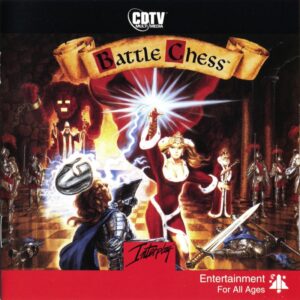
But my father was really into chess. He was a hobby player at the time, played at the local chess club, and he sometimes played on his computer a game called Battle Chess. In Battle Chess—which is a really ancient game in MS-DOS mode—when the pieces move they become a living human creature walking from one square to the other. When there’s a trade, they fight and one kills the other in a very weirdly animated old way, because it’s an ancient game. So basically like the Harry Potter chess, but in a very old computer game mode. We really liked watching my dad play this and wanted to play it too, but in order to play the game, you have to learn how the pieces move because the computer does not let you build towers or make illegal moves. So the reason why we learned, initially, the rules of chess and how to play was to be able to play this computer game back in the day.
AA: I love that, that’s amazing. Okay, so how did it turn from that into, “Wait a second I really love this,” or, “I’m taking it seriously?”
AR: The next step was that my dad was giving chess lessons at the local primary school. He was in charge of the chess club at the school as well, and I would go there after our lessons with my sister. We were so shy that sometimes we would just hide under the tables or play together, but only her and me, we didn’t want to play with other kids. So, he realized that he needed to give some kind of extra motivation or incentive for us to play against other kids too. He started offering us Kinder chocolate. He said, “If you play against that girl a game of chess, I’ll give you a Kinder chocolate. And if you play against that boy I’ll give you another Kinder chocolate.” So we started collecting Kinder chocolate by playing against some of the other school kids, and we realized that it’s actually not terrifying to play with other kids and we started liking more and more the game itself too. It was a world that originally started out for us as this animated computer game, but when we played against each other and with other school kids I think we realized that it’s a magical world without the animation too.
…we realized that it’s actually not terrifying to play with other kids and we started liking more and more the game itself too. It was a world that originally started out for us as this animated computer game, but when we played against each other and with other school kids I think we realized that it’s a magical world without the animation too.
AA: Amazing. Okay, so how did your dad get into chess? And then tell us about the chess scene in Hungary, because I know in the United States chess is kind of having a moment right now because of the Queen’s Gambit, and the United States had a moment too when Bobby Fischer was getting media attention. The US has been really behind other countries, especially in Europe and Eastern Europe especially. So was chess really popular when you were a kid, and were there other girls playing?
Wow I just asked you like five questions, sorry! Just answer whatever one of them you want to.
AR: Sure, I will try. The first thing I should say for sure because of Hungary, is that the best ever female chess player is from Hungary: Judit Polgár and the Polgár family, obviously the Polgár sisters. I always looked up to them and their achievements. So for me, growing up in Hungary meant that the biggest female chess role model was from the same country, and was living at the time, and is still living in Hungary.
I saw her at some of the chess events, she was giving chess simultaneous exhibitions, I had a chance to get a photograph with her when I was a kid. I had her signature in one of my books, and all those memories inspired me even more to try my best. I don’t think I ever thought that I could get to her height or her achievements but I wanted to try my best in my own way to get better and stronger because I met the biggest legend out there in the female chess scene.
AA: Okay, and was she known by even Hungarian people who didn’t play chess? Was she a national figure that was a household name? Everybody knew who Judit Polgár was?
AR: Yes, I would say most Hungarian people know who she is. She has been on national television multiple times on talk shows, in magazines, newspapers. She really has done an amazing job showing up to media occasions.
We later became friends so I know a lot now about the behind-the-scenes too. She was very conscious about taking the time to show up at interviews, to accept talk show invitations, because a lot of chess players don’t do it. She wanted chess as a whole to be more popular too, not just herself and her own brand and her fame so to say, she also did it for growing chess as a whole.
AA: How do you think that impacted you to see a female chess superstar as opposed to if there had been only male chess superstars? Do you think that impacted you as a girl at all when you were little?
AR: For sure. I think it’s so important to have a female role model for a little girl because you can associate yourself more with her.
In a way The Queen’s Gambit did something similar. Even if it’s a fictional character, Beth Harmon became a hero for a lot of people who didn’t have interest in chess, and then they started signing up for chess.com accounts, they started buying chess boards, they wanted to play their first games of chess with friends, and that was all thanks to a Netflix series. So, sometimes it’s real-life characters and heroes like Judit Polgár, other times its fictional characters, but I do think we need female role models for girls. Because if you can’t associate with the person that has achieved so much in the field where you are trying your best, I think it doesn’t feel like it’s something that you can do, that it’s something that’s a dream that suits you or fits you, that’s a path that’s doable for a girl.
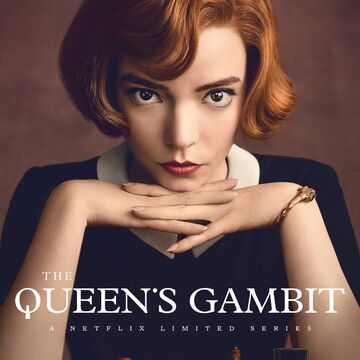
AA: Did you see a lot of other girls playing chess as a little girl, and then did that change at all as you got older?
AR: Yes, I would say that when I was a kid starting out in primary school (first/second grade) there would be quite a lot of girls at the chess tournaments I played. It would almost be 50/50, I think.
As we got older, from 14-15 and up, it every year felt like my age group was getting smaller and smaller in terms of the number of players. In the Hungarian Youth Championship (which I played every year since I was 11) I had some of my friends from different parts of the country I would meet at the tournament. That group originally was like a big tournament, and the next year a bit less, the next year a couple more girls dropped out…and sometimes the under-18 category would be such a small group that they would need to play two games against the same player to make it the same length of event because they didn’t have enough participants.
AA: Okay so that brings up an interesting question. Did girls ever play against boys?
AR: For the Hungarian Championships, the youth ones, they divided it into boys and girls categories. Other tournaments, the school tournaments or county tournaments, a lot of children’s events, I played mostly with boys in a mixed group.
AA: Okay so there’s some of each?
AR: Yeah.
AA: So then as you got older and it started thinning out, there were fewer and fewer girls, I guess one of the questions is—and you might say, “I don’t know, that’s the big mystery,” but maybe you have some insight—why is that? And I know that occurs in other…I would consider chess maybe to be in the STEM fields. It’s associated with math and science and those functions in the brain.
Why, Anna, do girls drop out of these fields when they get older? What do you think?
…if you can’t associate with the person that has achieved so much in the field where you are trying your best, I think it just doesn’t feel like it’s something that you can do, that it’s something that’s a dream that suits you or fits you, that’s a path that’s doable for a girl.
AR: It’s a really difficult question to answer. I feel like, from the friends that I had seen dropping out, many of them started having different interests. I feel like a lot of the girls I knew back then started developing other hobbies too, including my own sister. We started together and she dropped out when she was 12 I think, in fifth grade. She still kept going to some of the chess tournaments, but she would rather skip the training and do something else that she preferred. It is something that I don’t personally understand because I never lost interest in chess, but it felt like others, when they had other hobbies or other commitments, they didn’t always give chess the priority.
I also used to have a lot of extra scholar lessons that I was attending. I was in folklore dance group, I was in a music group, I was doing extra maths, extra drama lessons, aerobics. All of those groups had shows to prepare for, or on the weekend there would be, even if it’s a small stage show, you would need to prepare for it and then perform in front of the parents. It happened to me too that at some point I had to pick, am I going to the chess tournament or will I show up at the dance performance? And that’s when you need to decide which one is your priority, and I’m guessing that for the rest of the girls it wasn’t that obvious that chess should be the priority. I gave up a lot of things for chess. I liked dancing and music just as much, but I started to be good enough. I feel like the successes were making me feel more committed to chess because I felt like, “I’m getting somewhere.” If you are not among the best in your group it’s less motivating, it’s less encouraging, because you like the game but maybe you finish in the middle of the group or at the bottom of the standings. Then I understand that you probably don’t want to miss out on the dance show or the concert that your music group is giving. I think for sure it helped that I earned a few—even if just local and youth category—successes, but I had some early successes that made me feel like I belong here and I can get somewhere.
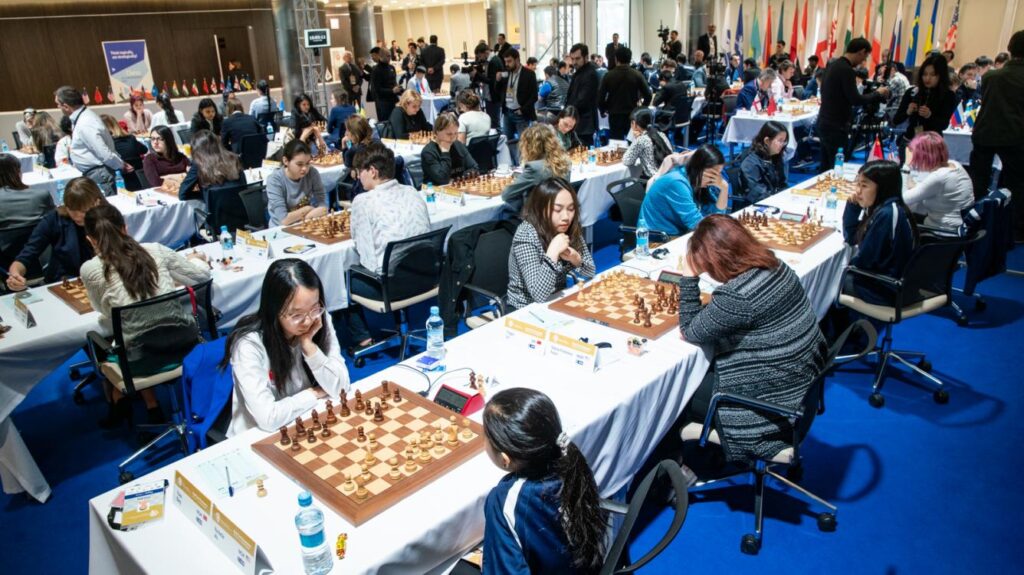
AA: I’m noticing as you’re talking that I think that everybody, no matter the gender, has that experience of having to choose between the various things that they’re interested in, right? Like sports, arts, and music and stuff, but there is something particular about girls and women in some of these fields that on top of that— it’s a human experience to be like, “What do I like more, what am I good at more, what do I succeed at?” But, what we were talking about earlier, having a role model and feeling like, “Oh, as a girl, have I had enough support? Have I had enough representation that I feel like, oh no I can do this as a girl?” That’s kind of an added layer on top of, “Can I do this as a person,” right?
It sounds like you had a lot of support, you particularly did. Do you feel like in Hungary, girls and women in general do get that support? Perhaps because you had Polgár as the role model, maybe in other parts of the world where girls aren’t as encouraged to play chess? Or, what do you think about that one?
AR: That’s an interesting question. I certainly think I was lucky that both of my parents were extremely supportive. It’s my dad who taught me, but my mom was just as supportive. They even organized family tournaments where my sister and me would be in the tournament, my parents—although my mom can barely play chess—and two of my grandmothers, too, would be included in the family chess tournament just so we could get some practice as kids. So it’s only my dad who was that much into chess, my grandma and my mom only know how the pieces move, but they played these local family tournaments because we liked it, my sister and me.
About the role model, I certainly think that for me it was huge that Judit is such a great ambassador for chess, and that she happens to be from the same country where I grew up. So for me she was the utmost role model, but I don’t know if that’s enough. From what you said, too, it also made me think about how I do think that chess is not the easiest of fields to stick to as a girl because there are discouraging factors. I certainly felt like, when I was a teenager, 16 and above, that there were already a lot fewer girls.
At my chess club, too, I was among the very few who still played chess, so most of my teammates were boys or grown-up men. You need to be absolutely in love with the game and so committed that even though it’s not your crowd, it’s not the usual friends you would hang out with, like 40-50 year old men and you’re just a teenage girl! I still kept going to the trainings and I kept traveling with a really male-dominated team to tournaments. I wanted to continue, but if I wasn’t decided that this was my path…I think it wasn’t a very encouraging atmosphere, even though my parents were supporting me the whole time, and even though I had Judit as a role model.
…most of my teammates were boys or grown-up men. You need to be absolutely in love with the game and so committed that even though it’s not your crowd, it’s not the usual friends you would hang out with, like 40-50 year old men and you’re just a teenage girl
It’s not the most pleasant on a day-to-day basis that there’s almost no girls I can hang out with. Sometimes we went to team events (and that would be 20 and above when I was at high school or university) and we would travel to these team championships. At the league, the Team Championship of Hungary, every team had to have one female player but that meant there were 11 men or boys, and one girl or woman as an obligatory board. So there were 12 players for each team and only one girl. I guess I’m lucky that there was an obligatory girl, so that there was at least one other person that I could see. But because the percentage of female participation was so low, even though it was obligatory to have a woman on each team, sometimes they wouldn’t even have the women’s toilet opened at the facilities, or just the bare minimum of decoration so that the rooms would just be very plain and not welcoming because no one really cared about that side of the event, it was just to have enough chess boards and chess clubs. To have the women’s toilet open is just, on a side note, it may not be that important because there are barely any girls. That doesn’t make you feel very welcomed in general.
AA: For sure. Okay, well speaking of not being made to feel very welcome, I want to read a couple of quotes from men. I just read a book just a couple months ago called Inferior: How Science Got Women Wrong and the New Research That’s Rewriting the Story. It’s by a British science writer Angela Saini, and she talks about this article that was written in 2015 by British grand master Nigel Short. He wrote this, I’m going to quote from the article:
“Men and women’s brains are hardwired very differently, so why should they function in the same way?”
And then he goes on to explain that his wife has higher emotional intelligence than he does, and that she’s not very good at driving a car, so she needs help maneuvering their car out of the garage. It’s just very much an article that’s like, “Well men and women are different, and, thus, women are inferior in these ways and they cannot play chess. They are incapable of playing chess at the level men can.” Then he’s like, “But she’s good at emotions.” So, there was a sociologist I believe who responded to him. She said,
“He thinks that there aren’t very many women chess players because they can’t play chess. It’s actually that they don’t play chess.”
She says female chess players have said that the aggressive and macho and sometimes even sexist atmosphere of professional chess is what can drive women away. So not only not having female role models, but I had no idea about those practical things like not having women’s bathrooms open. Nobody’s thinking about the women. But then you also have these men in chess who have a platform and who have a voice, saying really overtly sexist things. Have you encountered that, Anna? How does that feel to hear men say things like that and to encounter that hostility?
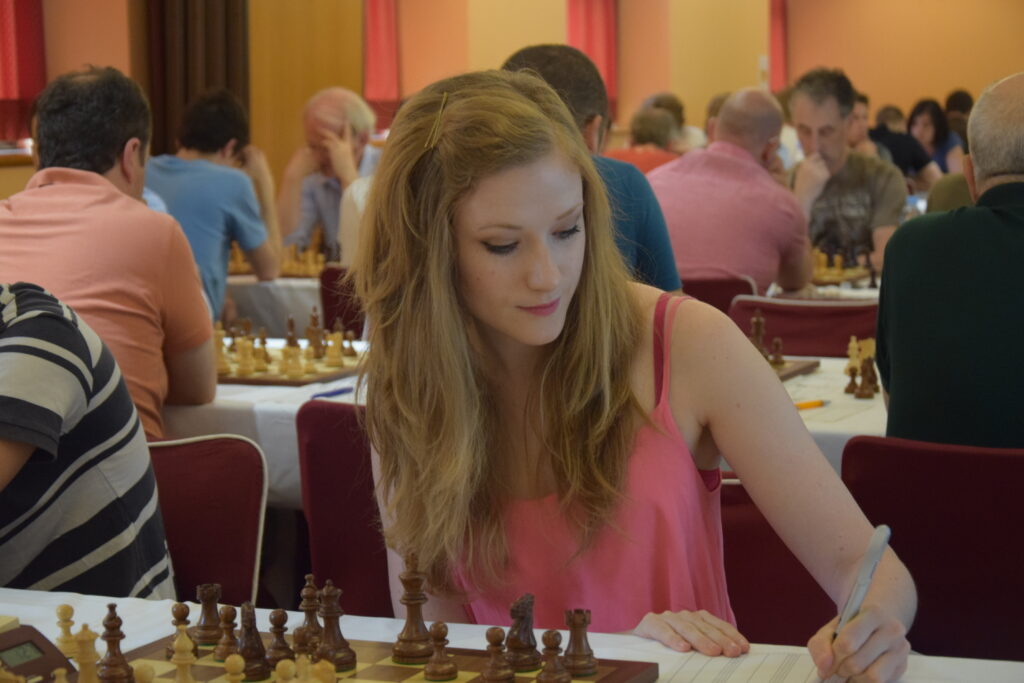
AR: Oh, it’s very hurtful. It’s extremely hurtful, and they’ve said those things before Judit became a top ten player in the world. Before she achieved that a lot of Grand Masters (including some of the former World Champions) had a very, very sexist opinion in the chess scene. It had to be Judit’s arrival as a chess prodigy; at the age of 12 and 13 she was already spotted, and she became the number one female chess player when she was 13 and then stopped competing among women when she was 14 because she was already so much better and her overall goal was to become the World Champion, not the Women’s World Champion. She never competed for the Women’s World Champion cycle, she competed to become the overall World Champion. I think that certainly changed the chess scene, that we had this one outstanding performance and she got to be the number eight player in the world. Not the World Champion yet, but she proved that she belonged there. She played against the strongest, she beat every single one of them in one game or two. She has taken down all the previous world champions. She broke down Bobby Fischer’s record too, becoming a Grand Master.
I think the fact that she managed to break those records, and prove that a woman is more than capable of being in the top of Grand Masters at chess, I think helped with those statements. Before Judit, it was even more brutal the kind of statements people would say, but even after I feel like some would say, “Yeah but she’s just an exception to the rule. It’s just one player who made it. How come her sisters didn’t become that strong?” Her sisters are extremely strong too, and they won the Olympic gold as a team of three sisters.
AA: Oh wow.
AR: So that’s a dream come true, a teenage team—Judit was 12, I think Zsófia was 14, and Zsuzsa was 18—when the three of them and Ildikó Mádl won the Olympic gold for Hungary among other teams like the Soviet Union, who kept winning gold one event after the other. They were a really strong team as a family, the three sisters, but only one of the sisters became so strong that she could almost win the overall World Chess Championship. It proved that it’s possible, but I think it’s still something that people are like, “Yeah, but does she—she is exceptionally intelligent, she trained to be a chess professional since she was born.” So people always try to find a “but” to her achievement instead of acknowledging that, yes, men and women are different but it doesn’t mean that men are more prone to chess or should be better chess players. In my opinion, a lot comes down to the socio-cultural factors:
- How women used to be treated and, unfortunately, are still treated in some countries.
- The inequality between male and female roles also in the household, that the woman should be prepared to become a mother and then look after the family instead of seeking her own career, not just in chess but in other fields too.
- And the participation gap, the fact that there are so few girls to so many boys at events at the scholastic level. I feel like it can be balanced depending on the country, but as soon as we reach teenage or older groups, it’s a lot less.
I read research recently that was about the Indian chess scene. It compared adults—so it took out all the youth groups—who have FIDE chess ratings and it added up the average rating of the players, whether it’s men or women. The rating was very similar, actually a bit higher for women, but the difference was that there were 94% men and 6% women in the whole scene of Indian chess players. And chess is really popular in India! But it was only 6% women… I think in other countries it would be even lower, where chess is not as popular as in India.
If it’s 6% women who are competing in the overall scene, how do you expect the 6% to achieve the same results as some of the 94% can? Then he went on to analyze that in the top 20 they only have one female chess player in India, but if you compare the 6% to 94% actually it’s a predictable number that one will make it, but not many because there are so many more male players to one female player.
…people always try to find a “but” to her achievement instead of acknowledging that, yes, men and women are different but it doesn’t mean that men are more prone to chess or should be better chess players
AA: How would you encourage girls who like chess, but then they get to be age 11 or 12 and they notice, “Oh, all my friends are dropping out, but I really love it,” and maybe, “What I see modeled at home is, well, I’m just going to grow up and be a mother anyway so why should I work this hard?” Or, “I like dance too, and all my girlfriends are in dance.” What would you say to these young girls if they do find themselves loving chess but wondering whether to stay?
AR: I wish I knew exactly how to convince them, because then I feel like I could send out the right message and bring more girls—actually not bring more girls in, but make them stay. Because I love chess, and I think it’s worth staying for even though there are negative and misogynist and sexist comments that we receive even now as grown women in the broadcasting or streaming scene. It’s not just about the competition, not just about tournaments, but the internet in general. Unfortunately, there is a negative and not so welcoming atmosphere too.
Overall, I think you should follow your heart and if you truly like the game and you truly like chess, and you enjoy studying, you enjoy learning, you enjoy growing and getting better bit by bit, it is worth it. Don’t listen to those who tell you you aren’t good enough, because everyone can! And everyone should be given a chance to be good enough.
All those statements from the ancient times, and all the Grand Masters saying this or that…I think they should read more and they should certainly look up more research and studies and educate themselves so that they don’t discourage the next generation from doing what they want to do. Everyone, whether it’s a boy or a girl, should be given a chance to do what they love and only be motivated and inspired. I’m hoping that nowadays YouTube and Twitch have given us more platforms to talk directly to the young boys and girls. I hope that means that we can be in a way not their Judit Polgár—I am so much worse than Judit when it comes to my chess skills, but I do show up on Twitch almost every day. I’m hoping that is a small step I can make toward at least helping more girls to be into something that I truly like and will stick to for the rest of my life.
…if you truly like the game and you truly like chess, and you enjoy studying, you enjoy learning, you enjoy growing and getting better bit by bit, it is worth it. Don’t listen to those who tell you you aren’t good enough…
AA: I love it. That’s so powerful, Anna, that’s awesome. As you were talking about these Grand Masters making these terrible comments, I looked up Bobby Fischer quotes. Horrible! Oh my goodness, I didn’t know. Like, so bad. He said “They’re weak, all women. They’re stupid compared to men. They shouldn’t play chess.”
I’m almost laughing, but it’s not funny at all, it’s horrible and super hurtful but it’s so blunt and not even a sophisticated argument or anything. It’s just the bluntest form of misogyny. One thing that I was a little bit encouraged about was reading Gary Kasparov. He made a terribly sexist comment a couple decades ago that there’s “real chess and women’s chess.” So insulting. But he’s since come around a little bit and is saying that he regrets saying that about women and is more encouraging. Am I understanding that right, Anna? Is that what you heard too?
AR: Yeah. I think so, and I so appreciate when even though they said horrible things, they then apologize for it or say that they were wrong. Even though Bobby Fischer’s statements were terrible, later on he ended up playing training matches against Judit and he invited the Polgár sisters over so that they could train together. Even if he verbally didn’t say that he was wrong, I feel like his actions are showing that he probably realized that he was in the wrong. He ended up appreciating Judit’s chess knowledge and skills and they trained together for some time.
AA: Oh, that’s fantastic! That’s great to hear. I love an inspiring story of progress. Even if we’re not aware, and would like to be eventually, that progress is really encouraging.
Okay, another question that I wanted to ask you is about sexism that you have experienced in your career. Is there a certain story that stands out to you that demonstrates this culture?
AR: Yeah, I think the most famous one would be when I was accused of cheating with an engine in my lip balm. That made it to New York Times, New York Post, Australia, New Zealand, Denmark, a caricature. It was literally everywhere in the world media, not chess media, world headline news type of media, that a 20-year-old girl playing at an international chess tournament plays the best chess of her life and three title players, men, say that she was most certainly using a chess engine hidden in her lip balm that was connected with a wireless internet in her backpack to a super computer. Every time she would open the lid off the lip balm she would see the right move inside the tin! And that’s how she almost won this chess tournament in France.
AA: No way. People took that seriously?
AR: Yes! When I first heard it I thought they must be joking, right?
But the sad part of it was, though, that this was a tournament between Christmas and New Year in France, winter of 2007. One of these title players, I think one was a Grand Master and two International Masters, or two Grand Masters and one International Master, but pretty strong chess players. One of them was my last round opponent. Later I learned that they complained during the event too, but nothing was said to me because I didn’t do anything. The arbiters checked my game as they requested but there was nothing that would have been wrong, that the moves of my chess games weren’t matching the chess engine too often.
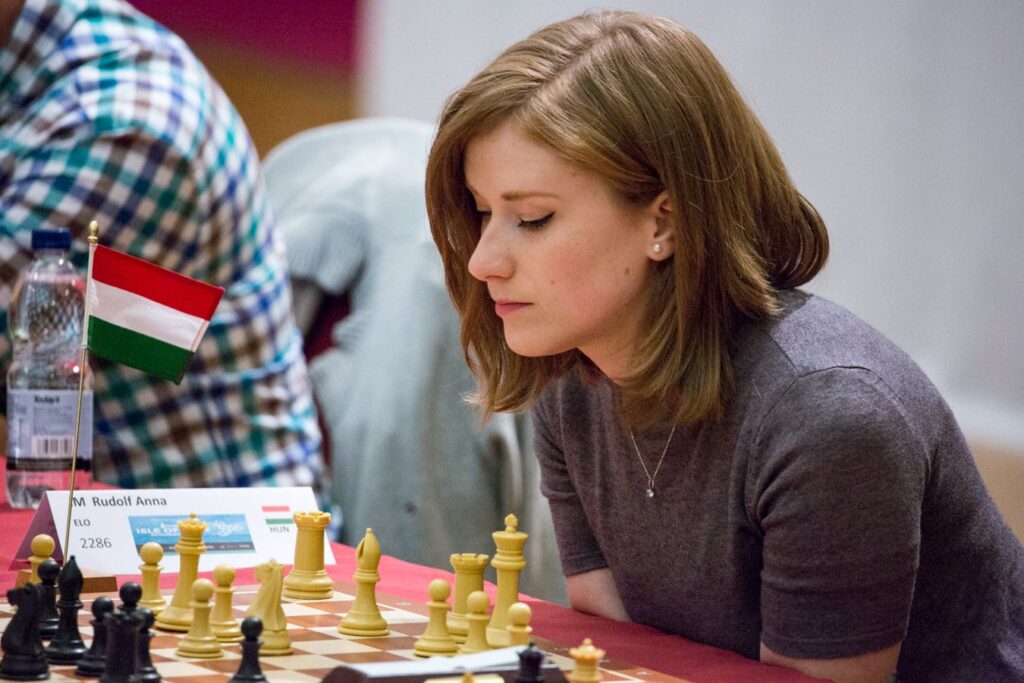
For those who don’t play chess, as context, nowadays the computer can play much better chess than any human being. If you have assistance from a computer, you can beat anyone in the world. Obviously, that is illegal, that is cheating, and you cannot have any device on you during the tournament.
They said that because I was winning game after game, and I was beating players who are a lot stronger than me, it was not possible that I was playing by my own strength and my own skill. They asked the arbiter to check my games after the first four rounds because I was leading the tournament after the first four rounds. The arbiter said, “No, there’s no matching, she’s just playing normal games, nothing suspicious.” But then I was still leading with one round to the end and I was paired against one of these people who thought that I was cheating. So then they went back to the arbiter and they demanded that they take action. The arbiter came to me before this final round of the tournament and said, “Anna, sorry, but there are a few people who complained, and we know that you aren’t doing anything, but just to make sure we’re going to need to take your backpack and check your items.” And then he ceremoniously opened the lip balm and looked at what was inside and oh my god it was lip balm!
I just couldn’t believe it. And then my opponent arrived. I was playing on the first board onstage, and he comes and I’m trying to shake his hand, I’m reaching out and he doesn’t even look at me. He sits down. The arbiter says, “Please start the clocks.” Every chess game starts with a handshake, so I’m trying to shake his hand again. He just shakes his head. I’m like, “What?” And he says, “You don’t play fair.” And I say, “I don’t play fair?” And he’s like, “Yes, you don’t play fair.” He just completely refused to shake my hand. That’s when I realized that one of the people who complained and accused me of cheating, now I know, is the person sitting in front of me, and I need to play this game calmly and try to do my best when this ‘gentlemen’ has literally accused me of cheating. That’s why my backpack and items were taken away. They let me have my lip balm on the desk, and my tissue and pen because I was given permission to use them, but it just felt very humiliating that he actually thought that I was cheating and requested the arbiter to take those measures that no one does.
Every time I wanted to stand up—because, in classical chess you have a couple of hours for each game so you have time to go to the bathroom, get some fresh air if you want to, maybe even a snack if you’re hungry—every time I wanted to stand up from the board because it was not my move, he quickly tried to make a move so I would have to sit back and not be able to leave the room. That’s how paranoid he was about me getting some help. I was on my own at this tournament in France! Yeah, the lip balm that became famous thanks to these three men.
AA: Unbelievable. How did you respond when that was published internationally in all these big publications? Did you make a formal response, or did you just ignore it? What did you do?
AR: The story was first written on one of the chess news sites by a journalist who was there in France at the tournament. She wrote about how outrageous it was what happened because no one believed these three people. To add to what happened after: I lost the game, and when I lost I just had to rush out of the playing hall and I started crying. But I didn’t cry because of losing the game, I cried because of what they did, and how unfair it felt that they could imagine that I’m capable of cheating.
At the closing ceremony of the tournament, when my name was called for the prize—I didn’t win the tournament in the end because I lost the last game—but when they called me for the top female prize, I got a bigger applause than the winner of the tournament, and it felt amazing that everyone stood by me. The strongest opponent I beat at this event, the number one player of the tournament, defended me immediately. He also defended me in the article that was published after the tournament. Luckily for me the big media picked up the story from when it was already clarified that I didn’t do anything and how ridiculous it is that they thought that in 2007 there’s this 20-year-old girl with James Bond technology in her lip balm.
The sad part of the story is that there are still sometimes people who come to my livestreams or broadcasts to call me a cheater in the chat because they heard a fragment of the story and they believe something that they haven’t experienced. They haven’t been there and they haven’t even done the research to check that the International Chess Federation had a case against these three people for what they did to me. Because they never apologized, and they never had any consequences for what they did. There are people who just read random comments on Reddit or YouTube and believe fragments of information and then come to me to call me a cheater. That side of it, when it’s already so many years past and these people just wouldn’t care to read the full story, is a bit hurtful even if it’s 10 years or so later.
They said that because I was winning game after game, and I was beating players who are a lot stronger than me, it was not possible that I was playing by my own strength and my own skill...
AA: Wow, that’s unbelievable. I had never heard that story, thanks for sharing it.
Okay, one more quick topic and that is that you mentioned in streaming too, and I’ve talked to a couple of other women who have been— you know, any time you put yourself out there on the internet you’re going to be a target for all kinds of the worst of human behavior, but especially a woman, and you happen to be a beautiful woman also. I’m wondering how you handle that? How do you handle sexist comments? Do you get it a lot, and what do you do when you get it?
AR: I think I’m lucky that on my own Twitch platform I have great moderators. So if someone shows up with the very clear intention of trying to be sexist, racist, anything that is completely outrageous, they get banned immediately. I don’t even address, or sometimes I don’t even have the time to read them because my moderators make it disappear. Where I experience more of the sexist comments is actually during broadcasts, because then I’m not own my own channel. I would be hired for commentary and sometimes it’s on Twitch, sometimes on YouTube, or YouTube comments if it’s a video I recorded, like a chess tutorial. Of course, if it’s something very outrageous the moderators on other platforms too would do their best to act, but there are other times where it’s bad what they say, but it’s not that bad to get banned for it. Those are the comments that get through when I’m doing commentary.
Nowadays I focus more on full-time streaming and content creation, but broadcasting used to be my job before the pandemic. I traveled from one event to the other. I got to cover some of the top events as a broadcaster. Back then, I was a freelancer so it depended on the organizers who they invited as their commentator. Usually it’s two people in the studio, so it’s not like there are many opportunities. I was really lucky that I got to be at some of the top chess events, including the World Chess Championship in London between Magnus Carlsen and Fabiano Caruana. If so many different organizers invited me as their broadcaster—they chose me. I was a freelancer, they don’t need to choose me, I don’t belong to their event, I don’t belong to any company, they just choose me—I feel like that, to me, should be like, I earned it. It’s because they think that I have the right skillset to be their main host for the broadcast. And yet, even though from the inside I feel like, “Yeah I know I earned it,” there still would be quite a few people at every single event, either on social media or on YouTube, that were questioning why her? Is it because she has a pretty face? That’s the only reason why she was chosen for the role.
In chess we have a ranking system that is a title system—so there would be the Grand Masters, the International Masters, and the rest of the titles—I have the International Master title that is above the Women’s Grand Master title. It’s a bit confusing how the system works, but I have the second highest title in the world. There are about 6,000 people with the International Master or Grand Master title overall on the planet, and they say 600 million people play chess, so it’s a very small group of people who achieve the ranking I have. But because there’s one title above mine, the people who pick on me say, “Well she’s not a Grand Master. Why is she hosting the event?”
I feel like it’s so unfair when it comes to a job like a broadcaster, a show host, a reporter, as if chess was the only skill that’s needed to have a camera presence, to be a good presenter, to be able to host a five-hour show with a smooth flow that no one actually realizes that time is passing and someone needs to fill the gap for 20 minutes because nothing is happening on the board. It feels like because ‘Grand Master’ and ratings are very easy to compare, those are the only things they compare. It’s true, there are 1,800 people who have a higher title than me, but they don’t realize that that’s not the only skill required for hosting an event. It hurt me every time they said that I’m just there to be a pretty face when the ratio between how many people play chess in the world and how many people have my title should have earned me some respect.
AA: Absolutely, and I can think of other chess commentators who are men in a similar position, that maybe don’t have the highest title and they’re men, and I’m guessing that they don’t get that said to them. Also, the other thing is—correct me if I’m wrong, but I feel like this happens in every field—you could be criticized, it could be used against you that, “Oh, you just have a pretty face.” If you didn’t have a traditionally pretty face then you would get comments like, “Oh, she’s not beautiful enough to be on camera.” Either way it’s a lose. It seems to me that men definitely have things that are hard for them in life, for sure, but they aren’t constantly criticized for how they look, either too handsome or not handsome enough, and using any excuse you can to tear them down by virtue of them being men the way women are constantly torn down.
AR: I 100% agree with you. I was just gonna add to that, that when I started out recording the video series back in 2013, I had very low self-confidence on camera. I didn’t know how to behave on camera, I didn’t know how to talk. I thought I was hired because they saw in me that I’m good at teaching chess, but just because you’re good at giving a lesson at the local chess club doesn’t mean that suddenly you’re going to be a great presenter for a video tutorial. I had to learn everything from zero, and at the start it was very difficult receiving constant comments about my appearance. I wasn’t even confident about my appearance, and people would constantly pick on anything they could. “Oh her nose is so big…Oh her voice is so annoying.” That was one of the most common ones. I guess I’m lucky in a way that one of the more common ones wasn’t exactly about my looks, but it hurt me that they made every single thing I was insecure about even bigger. They just magnified everything about my looks, everything about how I sound.
I had to train myself through TED Talks and YouTube videos on how can I become more confident on camera and how can I use my voice in a calmer and more presenter-like way. It’s true that at the start I was so nervous that I would talk faster. I think some comments hurt when you partially agree with them and I knew that, “Yeah, I’m nervous so I’m talking faster because I don’t know how to record videos because this is my first time recording videos and this is terrifying.” Any insecurity that one would have, whether it’s physical or whether it’s about your personality, they would be like, “Why is she smiling all the time? Why is she so bubbly?” They question every single thing, people on the internet, and it can be so hurtful and it makes you doubt whether you are actually as likable as you thought you were. People always find something to pick at.
I think you are very right about what you said that they would either think that you are there because of your looks or they would think that you are not as attractive as you should be. On that topic I would say, I don’t think I’m exceptionally this or that, I think the one thing I’m good at, what I learned to be good at, is being comfortable in my skin. I think that’s what gives us charisma, whether it’s a male or female presenter, streamer, or public speaker. When you’re comfortable in your own skin and when you learn to like yourself the way you are and accept your flaws, then it shows that the person on stage or the person on the other side of the camera is actually cool the way they are. I think that’s what makes a presenter or streamer or commentator attractive to others in a way. But it’s only that we learned to be okay with who we are. I think that’s something everyone can learn. That would be my takeaway.
AA: Yes, I agree. I’m glad you mentioned voice too, because another book that I read for Season 1 of this podcast was Women in Power by Mary Beard. She’s a professor in England and she talked about women’s voices being higher and that women’s natural voices are described as “annoying.” And I’m always self-conscious of my voice too. I used to lower it on purpose to be taken more seriously because a lower voice is masculine and you have to sound like a man to be taken seriously. There’s this inner battle of do I lower my voice so I’m taken more seriously? Or do I just speak in my natural voice and let the world get used to women’s voices saying smart, important things, and let people criticize it and just be like, “Yeah, you know what, you need to grow up and recognize that this is what a lot of women’s voice sound like. They’re in a higher register, get used to it.” I love hearing your natural voice and seeing the way you present. You do exude that self-confidence, and it’s a really joyful and grounded and loving self-confidence, and I think that is the most inspiring way to lead. I think you are an inspiration to so many people, men and women, boys and girls, but especially it makes me so happy for the next generation of girls who get to look up to you, Anna.
AR: Thank you so much, Amy. I don’t know what to do with so many complements. Honestly, I can only say the same, because what you do with your podcast and how you educate the next generation to be where hopefully one day we will be, that no longer we will need to discuss these topics because it will be understood that there is no such difference, and everyone should be just as respected and should be given the same opportunities.
AA: Agreed, may I soon be out of a job. May I soon not be speaking about this at all!
AR: Let’s root for that, Amy!
AA: Well fantastic, thank you so much Anna for joining us today. I learned so much from you and enjoyed every minute.
AR: Likewise, Amy. Can’t wait to see the next episode of the podcast.
…this 20-year-old girl with James Bond technology

in her lip balm…
Listen to the Episode
&
Share your Comments with us below!

